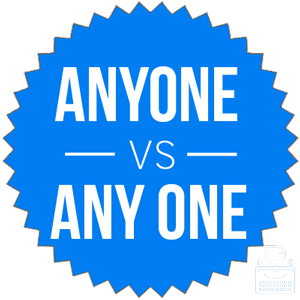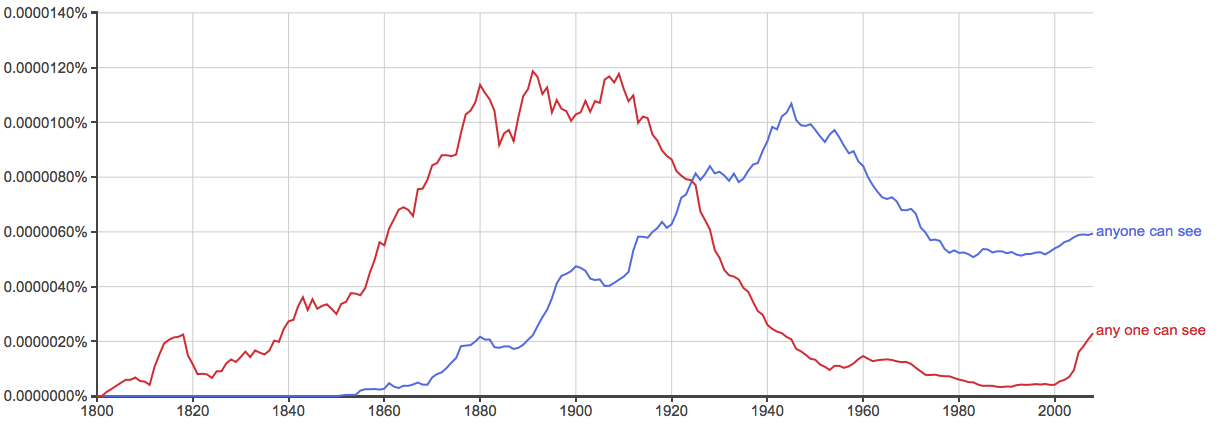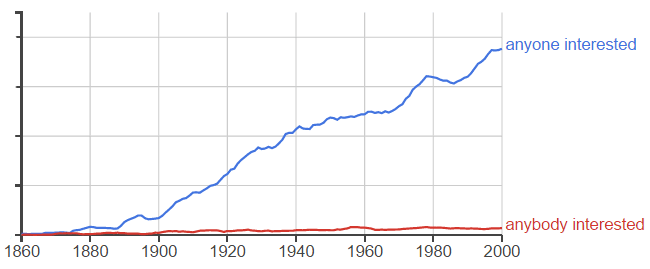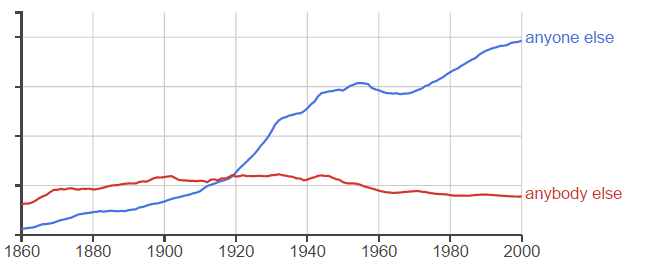As your English is improving, you start to notice more and more the subtleties of the language. A good way to work on such details is by taking private English lessons so that a teacher can focus on your individual needs. You should also try to self-diagnose your problem areas.
One of the difficulties that students have when learning English is mastering the correct use of indefinite pronouns. Today we’ll specifically focus on pronouns relating to people. This article will make the choice between “anyone”, “someone” and “no one” easier for you.
ANYONE
“Anyone” refers to “any person” and we use it when it doesn’t matter who the person is. In this context, the word “anyone” is always written together as one word. Have a look at the following examples:
Can anyone help me?
The person needs help but it doesn’t matter who the helper is. Questions like this could be addressed, for example, to a crowd of people.
Is anyone home?
This person wants to know if there’s someone at the house, they just want to know whether they’re on their own and they’re not looking for a specific person.
Please, don’t tell anyone.
The speaker in this sentence doesn’t want her news to be shared at all, they want it to remain a secret.
The good news about “anyone” is that it can be used interchangeably with “anybody” in most contexts, with a preference for “anyone” in formal communication such as in Business English.
What about “any one”? If you’ve ever seen that spelling, you may wonder whether it’s correct. The answer is: it depends. “Any one” with a space between the two words should only be used to refer to a member of a certain group. Compare these examples with the ones above:
Was any one of your children home?
This question refers to a representative of a specific group – one of the children of that person.
Any one of your friends could tell someone.
Just like in the previous example, also here the person is referring to someone from a specific group, one of the friends of the person they’re chatting to.

SOMEONE
“Someone” is another indefinite pronoun relating to people. You can use it to refer to a person in a situation when you don’t know who they are or their identity doesn’t matter:
Someone has eaten my cake.
You don’t know who that person is but the cake is missing. There must have been a person behind the action of eating it but you don’t know who they are.
She just wanted to tell someone about her secret.
She didn’t care who she was going to tell, in fact, it could have been anyone.
I need someone to help me with this task.
In this sentence, it doesn’t matter who the helper is as long as the person obtains assistance from them.
Is “someone” the same as “somebody”? Sometimes one word sounds better than another, which is why Freddie Mercury sings “Somebody to love”. “Someone” is also considered a bit more formal. Many people won’t notice the difference but to be on the safe side use “someone” rather than “somebody” in formal correspondence or in your essays.

NO ONE
“No one” is an indefinite pronoun used to refer to an absence of a person. There are two acceptable spellings of this word “no one” and “no-one”.
No one said anything in John’s defence.
To paraphrase, of all the people present, not even one person defended John.
He trusted no one in the whole world.
In other words, there was not even one person in the whole world that he trusted.
No one ever remembers my name.
Here “no one” is used for the purpose of exaggeration to express someone’s complaint about the fact that people seem not to remember their name.
Just like in the case of “anyone” vs “anybody” and “someone” vs “somebody”, “no one” is also considered more formal than “nobody”.
Do you understand now the difference between indefinite pronouns “anyone”,“someone” and “no one”? Do you know when it would be better to use “anybody”, “somebody” and “nobody” instead of them? Here’s a quick gap filling exercise to help you check your comprehension of the topic:
- I’ve asked you not to tell __________!
- I told __________.
- Well, __________ did say something because now my mother knows about it!
Are you ready for the answers? Scroll down…
…
…
…
…and down…
…
…
…
…In order of appearance, your answers should be ”anyone”, “no one” and “someone” with equally acceptable answers being “anybody”, “nobody” and “somebody”. Remember to avoid using the “-body” versions in the formal context.
You can use this article for reference, whenever in doubt. For best results with improving your English enrol in one of our courses and add a few private English lessons to your course!
The ‘guilt by association’ theory of statistical evidence of formality?
Interesting. You may be on to something here. The breathless «wow…a surprising gap…» is a little too much of what I’d expect from a sports announcer, rather than a cold, objective statistician, but that data are what they are.
Interchangeability? Let’s consider three terms for human copulation, one of which is clinical and formal, another somewhat formal, and the third vulgar 
Before we add somebody and someone into the mix, let’s see what we have for the
terms of union. Going from most rustic to most formal:
17,300,000 for «to fuck»
___541,000 for «to make love»
___267,000 for «to have sexual intercourse»
I am not surprised by the relative positions (no pun intended), as I would have expected the more colloquial term to be used most in writing as well as in what google doesn’t record, speech and text messaging.
Now let’s add someone and somebody, and observe:
Personalized Results 1 — 10 of about 264,000 for «to fuck» +somebody.
Results 1 — 10 of about 2,220,000 for «to fuck» +someone.
About an 8:1 ratio for someone to somebody.
Results 1 — 10 of about 227,000 for «to make love» +someone.
Results 1 — 10 of about 237,000 for «to make love» +somebody.
Here the difference is inconsequential. For all practical purposes it’s 1:1.
And now to the more formal term:
Results 1 — 10 of about 25,000 for «to have sexual intercourse» +somebody.
Results 1 — 10 of about 116,000 for «to have sexual intercourse» +someone.
The ratio is nearly 5:1 for someone to somebody.
If there is a convincing pattern here, I am too tired to see it. The most vulgar term favors combination with someone by an eight to one margin, and the least vulgar term does so at five to one. What may be most surprising, and difficult to explain, is the apparent one/body neutrality of the standard English phrase, to make love.
Further observations are invited.
As phrases become more and more common, they might become truncated into compound words. Today, rail road is railroad, and any one is anyone.
What do we do with the older versions of the phrases, though? Is there ever a reason to continue using them?
What is the Difference Between Anyone and Any one?
In this post, I will compare anyone vs. any one. I will discuss the differences between these spellings before providing example sentences for each.
I will also show you a memory tool that will give you an easy way to remember whether to use any one or anyone.
When to Use Anyone

Anyone is a synonym of its fellow pronoun anybody. Here are a few examples of its use in real sentences:
- “Has anyone seen a black car with tinted windows and a vanity plate?” asked the detective.
- Anyone can kill a monarch, but it takes a true leader to control a nation afterward.
- But anyone who inspires Sen. Elizabeth Warren to demand her demotion is doing something right. –The Wall Street Journal
When to Use Any One
What does any one mean? Any one is not the same as anyone, and the two spellings cannot be used interchangeably. Any one means any single person or thing. Any one emphasizes singularity.
For example,
- I cannot think of any one bad idea that you have presented today.
- The basketball star quickly proved that he could overpower any one defender, so opponents began double-teaming him.
- My grandfather held out several pieces of candy and told me I could have any one I wanted.
Any one occasionally appears as a pronoun, but this is relatively uncommon and should be avoided. These two spellings have developed their own usage cases.
As you can see from the chart below, which graphs any one vs. anyone over time, the two-word any one used to be more popular than anyone, but about halfway through the 20th century, writers began to prefer the new compound.
I have isolated the use of these variants as pronouns by graphing anyone can see and any one can see. The chart is still not scientific, as it only looks at books published in English since 1800. Still, it allows us to view a clear, long-term trend in favor of anyone.
Trick to Remember the Difference

- If you are using the word as a pronoun to refer to people, use anyone.
- Any one is written as two words and emphasized singularity. It is not used as a pronoun.
Since anyone rhymes with Tennyson, the last name of famous poet, and both are three-syllable single words, remember to use anyone when referring to people.
Also, the difference between these two words is similar to the difference between everyday and every day, everyone and every one, etc.
Summary
Is it anyone or any one? These two spellings are never interchangeable.
- Anyone is a pronoun referring to an unspecified person.
- Any one is a noun phrase that was once used as a pronoun.
Today, most writers reserve anyone exclusively for the pronoun sense.
Contents
- 1 What is the Difference Between Anyone and Any one?
- 2 When to Use Anyone
- 3 When to Use Any One
- 4 Trick to Remember the Difference
- 5 Summary
You’ve probably already tried to work out the differences between someone vs anyone, and that’s a good place to start. We’re here to help you truly learn what the differences are and when you should use them. We’ll also show you the positive ideas behind “someone” and the negative ideas behind “anyone.”
What Is The Difference Between “Someone” And “Anyone”?
Someone should be used when you’re asking for or wanting an unspecified person. This person usually comes with a few select qualities related to the situation. Anyone should be used when you’re asking for or wanting an unspecified person but do not care which person you end up getting. In both cases, you can use them as part of a question or as a sentence.
The Positive Meaning Of “Someone”
We’ll start by looking a little closer at “someone.” There is a positive meaning that’s closely associated with the use of “someone,” and most people will use it in this sense. When using “someone,” we’re asking for somebody unspecific that we don’t know (or do in some cases) to come out for us. These people will often be closely related to the task at hand, whether they’ve got specific qualifications to help out or something else.
When we say the positive meaning in this subtitle, we use “someone” in positive sentences or questions. We’re asking for help from somebody. Though the person is unknown in the context, the idea is that we really need their help and would appreciate them doing it. Let’s see what we mean.
- I need someone to help me out here.
This is a positive sentence, where somebody is in trouble and asks anyone to help them out with whatever has gone wrong.
- Could you find someone to give me a hand?
This is a positive question where someone is specifically asking for help. Typically, they’d be helped by the person with the most experience. However, the person they’re expecting to help them is unspecified, which usually means that anybody could come along to help them.
The Negative Meaning Of “Anyone”
Now we get to the negative meaning of “anyone.” It means much the same thing as “someone,” but when we use it, we’re referring to any specific person. The idea is that we truly don’t care who comes to help us out. This lack of care gives “anyone” the negative connotations that we’re about to share with you.
- Can anyone help?
This is a negative question that’s asking if someone can help. However, using “anyone” in this scenario shows that the speaker doesn’t care who comes out. In fact, they’re usually insulting the person they’re asking the question to, implying they can’t already help them out.
- I don’t want anyone. I want someone good.
This is another negative sentence where someone is saying they don’t want just any random person. They’re implying that the person they’re speaking to needs to find someone else to help, and it’s always used negatively.
Of course, in some scenarios, we can still use “anyone” in a positive light, though it’s not nearly as common in this sense. If we use the word “if” before “anyone,” we can typically write some positive sentences out of “anyone,” though the overall tone of the sentence is still seen as a negative one.
- If anyone could help me out, that would be great.
See here how this is a positive sentence. Somebody is indeed asking for help and don’t mind which person comes to help them. However, using anyone in this way shows the negativity coming through. It almost seems sarcastic or careless when someone speaks in this manner, so you should be careful using it this way.
Examples Of How To Use “Someone” In A Sentence
Now that we’ve seen a few examples of sentence structures with positive and negative connotations, it’s time to look at some examples more closely. Examples are some of the best ways to learn new language rules and structures to help you get a grasp of the English language. We’ll show you a few sentences, and you can see how “someone” is used first of all.
- I’d like to find someone who fits the criteria.
- They’re looking for someone to help them out.
- Can someone find me a suitable donor?
- I need someone to order my food for me.
- Could someone offer their seat for me?
Examples Of How To Use “Anyone” In A Sentence
We’ll also look at “anyone” in some examples. In these cases, you’ll see a slight hint of the negative meanings for each case. If you say them out loud, you’ll often be able to hear the underlying mocking tone that most people use when saying “anyone.” Of course, you shouldn’t use “anyone” in this regard if you’re talking to somebody you like, as it can be insulting.
- Is anyone out there?
- Is anyone going to help me with this?
- They are looking for just about anyone to work there.
- We’d like anyone who knows what they’re doing.
- If anyone keeps talking, I’ll give you all detention.
Does Someone/Somebody And Anyone/Anybody Have The Same Meaning?
What about “somebody” and “anybody?” When we use these words, do they mean the same thing? Well, yes. In fact, they are completely identical to “someone” and “anyone.” “Somebody” means that you’re looking for an unspecified person, though typically has the required criteria or qualities you’re looking for. It is used only in positive senses, just like we talked about above with “someone.”
“Anybody” is the same word as “anyone.” We use it when referring to an unspecified person, though we don’t care who comes when we ask for them. It’s mostly used in a negative sense and is synonymous entirely with the word “anyone.” You can easily replace both words with these counterparts and get the same meaning.
There isn’t a rule you need to follow in choosing which one either. “If anyone can help” is the same grammatically as “if anybody can help.” Don’t worry about getting them confused. Just work with whichever word you find sounds and looks best for you.
You might also like: Me And Someone” Or “Someone And I”: Which Is Correct? (12 Examples)
Martin holds a Master’s degree in Finance and International Business. He has six years of experience in professional communication with clients, executives, and colleagues. Furthermore, he has teaching experience from Aarhus University. Martin has been featured as an expert in communication and teaching on Forbes and Shopify. Read more about Martin here.


Short answer: “Anyone” and “anybody” mean the same, perhaps with one exception. Long answer: Some authors ascribe slightly different meanings to the two words, but this does not seem to be supported by their modern usage, although there seems to be one case where they are not completely equivalent.
Both “anyone” and “anybody” can be used to ask questions,
Does anyone have a pen?
Does anybody have a pen?
in general statements,
Anyone can learn to draw.
Anybody can learn to draw.
and in negative sentences, such as
I don’t know anyone there.
I don’t know anybody there.
If there were slight differences in meaning, they should be revealed by differences in collocations (words commonly used in combination with the given word), just like is the case with the words “intensive” and “intense”, for example.
I have examined the collocations of “anyone” and “anybody” in an English language corpus, and there seem to be virtually no differences between them at all. They are used in the same contexts and combined with the same words, and while “anybody” is, in general, less common than “anyone”, the ratio seems to stay relatively constant for the collocations.
The only oddity I have noticed is that “anyone interested” is significantly more common than anybody interested, in a way that is not explicable by the general ratio of the number of occurrences of “anyone” and “anybody”. In fact, “anyone interested” is exceptional also in that it has always been more common than “anybody interested”. Take a look at the following graph showing the relative frequency of “anyone interested” and “anybody interested” in English literature:
and compare it with the corresponding graph for other typical collocations, such as “anyone else” and “anybody else”:
(Please note that the graph does not indicate that the spoken form of “anybody” was more common than “anyone” in the past; both “anyone” and “anybody” used to be spelled as two words (“any one” and “any body”), and when both variants are taken into account, it turns out that “anyone” and “any one” have always been more popular than “anybody” and “any body”.)
Other collocations of “anyone” and “anybody”, except “anyone/anybody interested”, follow the same pattern: “anybody + something” used to be more common until the early 20th century, when it was overtaken by “anyone + something”.
Probably the main reason is that “anyone interested” is used in notices such as, “Anyone interested in participating should call […].” Apparently, using “anybody” instead of “anyone” is not common in this context.
In conclusion, “anybody” and “anyone” are almost completely interchangeable, but “anyone” is probably a somewhat safer option because it is more common in contemporary English. One exception to their interchangeability is the phrase “anyone interested”, where replacing “anyone” with “anybody” seems to be rather unusual.
Subscribe to my educational newsletter
to receive a weekly summary of new articles
Enter your email address below:
Please, enter a valid email address:
You tried to submit the form very quickly after opening this page. To confirm that you are a human, please, click on the button below again:
Use the image
You can use the image on another website, provided that you link to the source article. If you share it on Twitter or Facebook, I kindly ask you to tag my profile @JakubMarian.
If you share it on reddit, please, share a link to the whole article and give credit to my subreddit r/JakubMarian in the comments.





